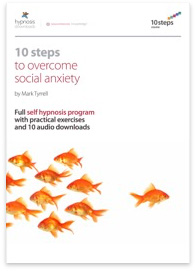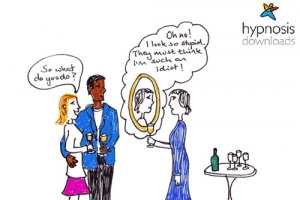Overcome Shyness in 5 Easy Steps
Use these shyness-busting tips to become more extrovert
 "Overcome Shyness in 5 Easy Steps" courtesy of AJU_photography
"Overcome Shyness in 5 Easy Steps" courtesy of AJU_photographyKate found the wedding invitation skulking on her doormat like some malignant portent of doom. Crippling shyness meant that what she should enjoy, the chance to mingle with friends and meet new people, felt like an ordeal devised by an overly sadistic Spanish Inquisitor.
"I've always been shy! I hate the feeling of people's attention suddenly turning on me!" Despairingly, she told me she'd reached a point in her life where she wanted to stop worrying what others might think so she could meet new people and openly voice her ideas.
Her shyness was typical: Fear of meeting new people, lack of self confidence, self consciousness, and feeling by turns 'invisible' or all too visible. But she now reckons she has got rid of 95% of her shyness.
I'd like to share with you some of the tips and techniques I used to help her.
So to kick us off, I want you to think about where you put your attention...
1) Focus outwards, away from your shyness
Shyness makes us self absorbed. This is descriptive, not judgemental. Shy people can feel they have 'nothing to say', that they should have amazing stories to tell and be the life and soul of the party. But consider this:
People love you when you find them interesting. Overcoming shyness isn't about suddenly thinking you're great. It's more about forgetting yourself and focusing outward.
Ask questions and cultivate genuine curiosity. If you are at a party with strangers, try to connect how everyone knows each other. You can ask questions such as: "How do you know Kathy?" (if Kathy is throwing the party J) or: "I live next door. Are you one of Kathy's tennis friends?" This:
- Gives you something to talk about.
- Gives other people a chance to talk about themselves (for which they will love you).
- Takes your attention off yourself.
Until shyness fades more completely, the next tip will also help you out.
2) Prepare properly
Once shyness has gone you won't need to do this; but whilst you still feel shy, practice preparing topics of conversation. If you have an idea of the type of people that are going to be at a gathering, then do a little homework. If many of them are sailing enthusiasts, for instance: Google the local sailing club, find out local sailing routes, prepare a few questions to ask about sailing.
If you feel shy at work, look out for interesting news items over the weekend and bring them into conversation on Monday.
Get into the habit of remembering what people have told you and referring back to it as future conversation starters: "Hey John, you know you were saying you wanted to see that film? Well I saw last night that it's now playing at The Nomoorshyness Cinema!" or: "Jane, you were telling me that your daughter loves the circus; apparently there is a circus coming to town next week..."
But overcoming shyness isn't just about talking more.
3) Send the right signals
Shy people are often misdiagnosed as unfriendly, aloof, or 'stuck up'. Shyness can make us look unapproachable.
Research has found that we find people who smile and look directly at us more attractive (1). And people are 86% more likely to strike up conversations with strangers in the street if they are smiling.
Another benefit is that smiling even when you don't feel like it actually makes you feel better – which can lead to real smiling. :)
An important point here: If you smile at someone and they don't smile back, that is not your problem. We can't make anyone accept our friendliness any more that we can make someone like us through sheer force.
4) Focus on putting other people at their ease
Working as a hypnotherapist I've seen so many clients who suffered from arachnophobia – fear of spiders. The trouble was, I had a fear of spiders myself! But rather than working on myself directly, I found that working to lift other people's fear magically lifted my own.
The point here is that by focusing on putting other people at their ease, you'll find that you feel much more comfortable. Notice who seems a little more diffident or anxious and work to help them feel more relaxed.
5) Learn to manage anxiety
Shyness is really a type of social anxiety. Manage your anxiety by:
- Making your out-breath longer than your in-breath. Extending the out-breath begins to relax body and mind very quickly. Once you feel more relaxed, you instantly feel more sociable.
- Rehearse being confident. Mentally rehearsing being more outgoing and relaxed has amazing results. Lie down somewhere comfortable, focus on breathing deeply and slowly, and imagine watching yourself in the upcoming social situation looking relaxed, comfortable, and even talkative. You'll be amazed how this 'self hypnotic' preparation will affect the way you actually feel when you get there.
Bonus Tip!
And lastly, start to 'wear out' shyness by putting yourself in as many social situations as possible. We build fear around what we avoid; so by purposefully seeking out situations which would have made you feel shy, you can begin to kick that shyness out of your life.
Since overcoming shyness, Kate has discovered whole new dimensions to her life.
Using hypnosis to overcome shyness successfully and easily
Listen to our Overcoming Shyness and Social Anxiety audio session here.
10 Steps to Overcome Social Anxiety course
If just the thought of small talk makes you nervous, and social situations make you feel ill, then read on to find out how you can become socially confident and relaxed...
Get a free hypnosis session with our new Social Anxiety app for iOS & Android:
Includes our most popular social anxiety session free, with the option to upgrade to 10 more sessions.
Get the Social Anxiety app for iOS (iPhone or iPad) here or for Android here.
References
- Claire Conway and colleagues at the University of Aberdeen in Scotland found that both men and women deemed faces looking straight at them to be more attractive and more likeable, even if the faces looked disgusted. Though unsurprisingly, there was a greater preference for smiles.










